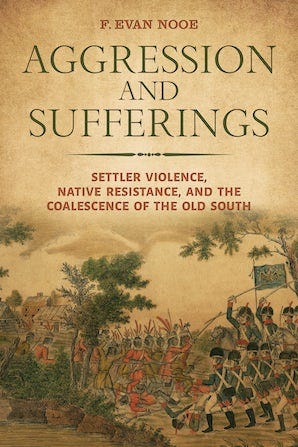Aggression and Sufferings: Settler Violence, Native Resistance, and the Coalescence of the Old South
A new story of the Old South
Part of what I want to do with this Substack is continue to alert you to new works that you might want to know about.1 This post is about a book that is new to you but old to me. The book I’m talking about is the one you read about in the title of this post: Aggression and Sufferings: Settler Violence, Native Resistance, and the Coalescence of the Old South by Evan Nooe. Evan is an assistant professor of history at the University of South Carolina, Lancaster. More important than that, Evan is a friend, and a good one. I’ve had the opportunity to watch his project develop over the last few years and I’m excited that he gets to share it with the world. It’s published by the University of Alabama Press, which is doing some great stuff in the Native South.
Amazon can probably explain it better than I can, so here’s the blurb:
A bold reconceptualization of how settler expansion and narratives of victimhood, honor, and revenge drove the conquest and erasure of the Native South and fed the emergence of a distinct white southern identity
In 1823, Tennessee historian John Haywood encapsulated a foundational sentiment among the white citizenry of Tennessee when he wrote of a “long continued course of aggression and sufferings” between whites and Native Americans. According to F. Evan Nooe, “aggression” and “sufferings” are broad categories that can be used to represent the framework of factors contributing to the coalescence of the white South.
Traditionally, the concept of coalescence is an anthropological model used to examine the transformation of Indigenous communities in the Eastern Woodlands from chieftaincies to Native tribes, confederacies, and nations in response to colonialism. Applying this concept to white southerners, Nooe argues that through the experiences and selective memory of settlers in the antebellum South, white southerners incorporated their aggression against and suffering at the hands of the Indigenous peoples of the Southeast in the coalescence of a regional identity built upon the violent dispossession of the Native South. This, in turn, formed a precursor to Confederate identity and its later iterations in the long nineteenth century.
Geographically, Aggression and Sufferings prioritizes events in South Carolina, Florida, Tennessee, Georgia, and Alabama. Nooe considers how divergent systems of violence and justice between Native Americans and white settlers (such as blood revenge and concepts of honor) functioned in the region and examines the involved societies’ conflicting standards on how to equitably resolve interpersonal violence. Finally, Nooe explores how white southerners constructed, propagated, and perpetuated harrowing tales of colonizers as both victims and heroes in the violent expulsion of the region’s Native peoples from their homelands. This constructed sense of regional history and identity continued to flower into the antebellum period, during western expansion, and well through the twentieth century.
The book releases today wherever you like to buy your books. Hope you enjoy.
The Morris Forum on the Native South
And if you’re interested in learning more about emerging scholarship in the Native South, I have good news for you. A few years ago we created the Allen Morris Forum on the Native South, which meets virtually a few times each year. It’s now part of the Native American and Indigenous Studies Center at Florida State University. What makes this different is that a single early career scholar presents their work via a precirculated paper and then receives feedback from a designated historian as well as the audience. Anyway, if you’re interested, tomorrow, December 7th, at 4:30 eastern Dr. Jessica Wallace is presenting some of her work on Cherokee history. If you would like to receive the paper and attend, email Andrew Frank at afrank@fsu.edu to get an invite. Tell him I sent you.
I’m not compensated for any book recommendations whatsoever. Just bringing you the news.





